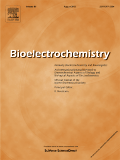
BIOELECTROCHEMISTRY
Scope & Guideline
Catalyzing Breakthroughs in Biochemistry and Electrochemical Science
Introduction
Aims and Scopes
- Electrochemical Biosensing:
The journal emphasizes the development of sensitive and selective electrochemical biosensors for detecting biomolecules, pathogens, and disease markers, utilizing various materials and signal amplification strategies. - Bioelectrochemical Systems:
Research on microbial fuel cells, electrochemical systems for wastewater treatment, and other bioelectrochemical setups is a key focus, exploring their potential for sustainable energy generation and environmental remediation. - Electroporation and Gene Delivery:
The journal highlights studies on electroporation techniques for enhancing gene delivery and cellular uptake, particularly in cancer therapies and regenerative medicine. - Nanomaterials and Electrochemical Interfaces:
There is a consistent focus on the synthesis and application of nanomaterials to improve electrochemical performance, enhance biosensor sensitivity, and facilitate electron transfer in biological systems. - Biomedical Applications:
Research articles often explore the application of electrochemical techniques in the biomedical field, including cancer diagnostics, therapeutic monitoring, and the understanding of cellular responses to electric fields.
Trending and Emerging
- CRISPR/Cas-based Detection Methods:
There is a rising trend in the use of CRISPR/Cas systems for electrochemical biosensing, showcasing their potential for sensitive and specific detection of nucleic acids and proteins, which may revolutionize diagnostic approaches. - Integration of Machine Learning and Data Analysis:
The incorporation of machine learning techniques in analyzing electrochemical data and optimizing sensor performance is becoming increasingly prevalent, indicating a convergence of computational methods with experimental electrochemistry. - Sustainable and Green Bioelectrochemical Systems:
Research focused on eco-friendly and sustainable approaches within bioelectrochemical systems, such as renewable energy production from waste materials and environmentally safe corrosion inhibitors, is gaining momentum. - Advanced Nanomaterials for Sensing and Catalysis:
The development and application of novel nanomaterials, including MXenes, quantum dots, and carbon nanostructures, for enhancing the performance of electrochemical sensors and catalysts is increasingly common. - Point-of-Care Devices:
There is a growing emphasis on the development of portable and user-friendly electrochemical devices for rapid diagnostics, particularly in the context of infectious diseases and chronic health monitoring.
Declining or Waning
- Traditional Electrochemical Sensors:
There is a noticeable decline in publications related to conventional electrochemical sensors without the integration of advanced materials or nanotechnology, indicating a shift towards more innovative and hybrid sensing technologies. - Basic Electrode Material Research:
Research focusing solely on basic electrode materials without functionalization or specific applications appears to be waning, as the field moves towards more application-driven studies that emphasize performance enhancement through advanced composites. - Non-specific Electrode Applications:
Studies that explore electrochemical applications with limited biological relevance or specificity are becoming less frequent, reflecting a trend towards more targeted and application-specific research.
Similar Journals

BioChip Journal
Exploring the Frontiers of Biochip Technology and ApplicationsBioChip Journal, published by the Korean Biochip Society (KBCS), is a renowned academic platform dedicated to advancing the fields of bioengineering, biomedical engineering, biotechnology, and electrical and electronic engineering. With its ISSN 1976-0280 and E-ISSN 2092-7843, this esteemed journal has established itself as a valuable resource for researchers, professionals, and students alike, providing them with cutting-edge research and insights since its inception in 2008. The journal has earned a commendable standing in the academic community, achieving Q2 ranking across key categories, thereby placing it amongst the top-tier publications. With its impressive Scopus rankings, including a top 10% position in Electrical and Electronic Engineering and a strong showing in both Biomedical Engineering and Biotechnology, BioChip Journal plays a vital role in disseminating innovative biochip technologies and applications. The journal continues to invite groundbreaking studies and reviews that promote the interdisciplinary collaboration essential for the future of biochip research, ultimately contributing to advancements in healthcare, diagnostics, and therapeutics.
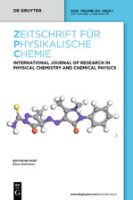
ZEITSCHRIFT FUR PHYSIKALISCHE CHEMIE-INTERNATIONAL JOURNAL OF RESEARCH IN PHYSICAL CHEMISTRY & CHEMICAL PHYSICS
Exploring the Depths of Physical ChemistryZEITSCHRIFT FUR PHYSIKALISCHE CHEMIE-INTERNATIONAL JOURNAL OF RESEARCH IN PHYSICAL CHEMISTRY & CHEMICAL PHYSICS, published by WALTER DE GRUYTER GMBH, is a highly regarded platform for researchers in the field of physical chemistry and chemical physics. With an ISSN of 0942-9352 and an E-ISSN of 2196-7156, this journal serves as a vital resource for the dissemination of original research, critical reviews, and insightful discussions that span theoretical and experimental investigations. Recognized for its quality, it holds a Q2 classification within the 2023 quartiles of Physical and Theoretical Chemistry and ranks 72nd out of 189 in the Scopus database, placing it in the 62nd percentile. The journal’s extensive publication history, originating from 1943, showcases its long-standing commitment to advancing the understanding of complex chemical phenomena. Although it currently does not offer open-access options, it continues to attract contributions from leading experts worldwide, making it essential reading for professionals, researchers, and students dedicated to pushing the frontiers of chemical science. The journal is located in Berlin, Germany, at Genthiner Strasse 13, D-10785 Berlin, Germany.

JOURNAL OF SOLID STATE ELECTROCHEMISTRY
Advancing the Frontiers of Solid-State ElectrochemistryThe Journal of Solid State Electrochemistry is a leading peer-reviewed journal dedicated to advancing the understanding and application of solid-state electrochemical systems. Published by Springer, this prestigious journal has been a staple in the field since its establishment in 1997, with an impressive range of topics covering Condensed Matter Physics, Electrochemistry, and Materials Science. It holds a notable Q2 category quartile ranking in several disciplines, including Electrical and Electronic Engineering, and boasts significant Scopus rankings—ranked #28 in Electrochemistry, showcasing its credibility and impact in the field. With a mission to disseminate high-quality research and innovative methodologies, the journal aims to foster cross-disciplinary collaboration among researchers, professionals, and students. While not open access, articles published in the Journal of Solid State Electrochemistry are integral for those exploring cutting-edge technologies through theoretical and practical approaches, ultimately enhancing our understanding of energy systems and materials' performance. Located in Germany, the journal continues to thrive internationally, providing a robust platform for scholarly communication.
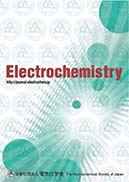
ELECTROCHEMISTRY
Fostering Collaboration in Electrochemical ResearchELECTROCHEMISTRY is an esteemed journal published by the Electrochemical Society of Japan, dedicated to advancing the field of electrochemical science and technology. With an ISSN of 1344-3542 and an E-ISSN of 2186-2451, this journal has been providing a platform for scholarly communication since its inception in 1996, with a converged scope extending to 2024. As an Open Access publication since 2020, it facilitates the wide dissemination of research, fostering collaboration among researchers, professionals, and students alike. Currently positioned in Q3 of the electrochemistry category and ranking 52 out of 60 in Scopus, ELECTROCHEMISTRY is committed to publishing high-quality, peer-reviewed articles that explore novel electrochemical systems, applications, and methodologies. With its base in Tokyo, Japan, the journal serves a global audience, promoting cutting-edge research that drives innovation in energy, materials science, and analytical chemistry.
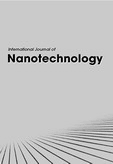
International Journal of Nanotechnology
Exploring Innovative Dimensions of NanotechnologyInternational Journal of Nanotechnology, published by INDERSCIENCE ENTERPRISES LTD, is a prominent academic platform dedicated to advancing research in the rapidly evolving field of nanotechnology. With an ISSN of 1475-7435 and an E-ISSN of 1741-8151, this journal has been contributing valuable insights and innovative findings since its inception in 2004. Although currently not an open-access publication, it serves as an essential resource for researchers, professionals, and students alike, encompassing critical areas such as bioengineering, condensed matter physics, and materials science. The journal is indexed in Scopus, highlighting its academic rigor, albeit ranking in the lower quartiles across several categories. As it progresses towards its 2024 milestone, the International Journal of Nanotechnology continues to play a crucial role in fostering collaborative scientific discourse and pushing the boundaries of knowledge in nanoscience. With a distinguished reputation in the United Kingdom and beyond, it is a vital tool for anyone looking to stay at the forefront of nanotechnology advancements.

Journal of the Korean Electrochemical Society
Pioneering Insights into Electrochemical Processes and MaterialsJournal of the Korean Electrochemical Society (ISSN: 1229-1935, E-ISSN: 1229-1935) stands as a prominent publication in the rapidly evolving field of electrochemistry. Published by the prestigious Korean Electrochemical Society, this journal serves as a vital platform for researchers, professionals, and students eager to disseminate and access cutting-edge studies related to electrochemical processes, materials, and technologies. With an emphasis on promoting innovative research and practical applications, the journal aims to foster collaboration and knowledge exchange within the global electrochemistry community. Although not an open access journal, it provides comprehensive and rigorous peer-reviewed content that ensures the highest scientific quality, making it a valuable resource for anyone involved in the field. Located in Seoul, South Korea, it continues to contribute significantly to the advancement of electrochemical sciences, addressing key challenges and developments that shape the future of technology and environmental sustainability.
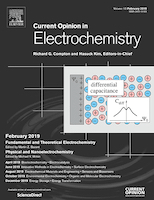
Current Opinion in Electrochemistry
Elevating Knowledge in Electrochemical ApplicationsCurrent Opinion in Electrochemistry, published by Elsevier, stands at the forefront of research in the fields of Analytical Chemistry and Electrochemistry. With an impressive Impact Factor reflected in its Q1 quartile rankings for both categories, this journal holds a significant place among its peers, ranking 9th in Analytical Chemistry and 8th in Electrochemistry according to Scopus metrics. Launched in 2017, it has rapidly become a vital platform for the dissemination of cutting-edge insights, reviews, and critical assessments that shape the future directions of electrochemical research and applications. As researchers, professionals, and students engage with its content, they find not only a repository of knowledge but also a source of inspiration for innovative experiments and applications. Readers can explore the wealth of information this journal provides to stay updated with contemporary trends and emerging technologies in electrochemistry. With a commitment to high-quality scholarly content, Current Opinion in Electrochemistry is your essential guide to the evolving landscape of electrochemical science.

ACTA CHIMICA SINICA
Advancing the Frontiers of Chemical KnowledgeACTA CHIMICA SINICA, published by SCIENCE PRESS, is a distinguished peer-reviewed journal in the realm of Chemistry, specifically focusing on general and miscellaneous chemistry fields. Since its inception in 1982, the journal has consistently contributed to the advancement of chemical research in China and beyond, maintaining a reputable standing within the academic community, evidenced by its 2023 Scopus ranking of #197 out of 408 in its category. With a current impact factor placing it in the Q3 quartile, ACTA CHIMICA SINICA aims to disseminate innovative research findings, covering a wide spectrum of topics within the discipline. Although it is not an open-access journal, it offers various access options through institutional subscriptions, ensuring that its high-quality content is available to a broad audience. Researchers, professionals, and students alike will find this journal a vital resource for keeping abreast of developments in the field and for contributing their own findings to an engaged scientific community.
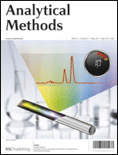
Analytical Methods
Connecting Ideas, Transforming PracticesAnalytical Methods, published by the renowned Royal Society of Chemistry, is a distinguished journal that has been serving the scientific community since its inception in 2009. Specializing in the fields of Analytical Chemistry, Chemical Engineering, and General Engineering, this journal holds a reputable position with an impressive Q2 ranking in three relevant categories as of 2023. With its focus on innovative methodologies and advanced applications in analytical science, it aims to disseminate cutting-edge research and foster dialogue among researchers, professionals, and students. Although it is not an open access publication, it is accessible worldwide and provides critical insights into the latest developments in analytical techniques and their engineering applications. The journal also ranks highly in pertinent Scopus categories, such as being in the 77th percentile for General Engineering and 61st percentile for Analytical Chemistry, underlining its significance in advancing knowledge and practical applications in these fields. By participating in this journal, readers can expect to engage with high-quality research that influences the future of analytical practices and chemical engineering.
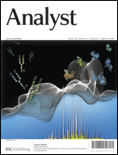
ANALYST
Elevating Knowledge in the Heart of Chemical ResearchANALYST, published by the Royal Society of Chemistry, stands as a prestigious journal in the fields of Analytical Chemistry, Biochemistry, Electrochemistry, Environmental Chemistry, and Spectroscopy. Esteemed for its rigorous peer-review process and influential contributions to the advancement of scientific knowledge, the journal has been a vital resource for researchers and professionals since its inception in 1876. With an impressive Scopus ranking that places it in the top quartile for several chemical disciplines, it specifically ranks #12 in Spectroscopy and #31 in Analytical Chemistry, reflecting its robustness and relevance in the analytical sciences. Though currently not an Open Access publication, ANALYST provides valuable insights and cutting-edge research that help drive innovation and discovery in various scientific realms. Researchers and students alike will benefit from its commitment to disseminating high-quality research that addresses contemporary challenges and promotes interdisciplinary collaboration.